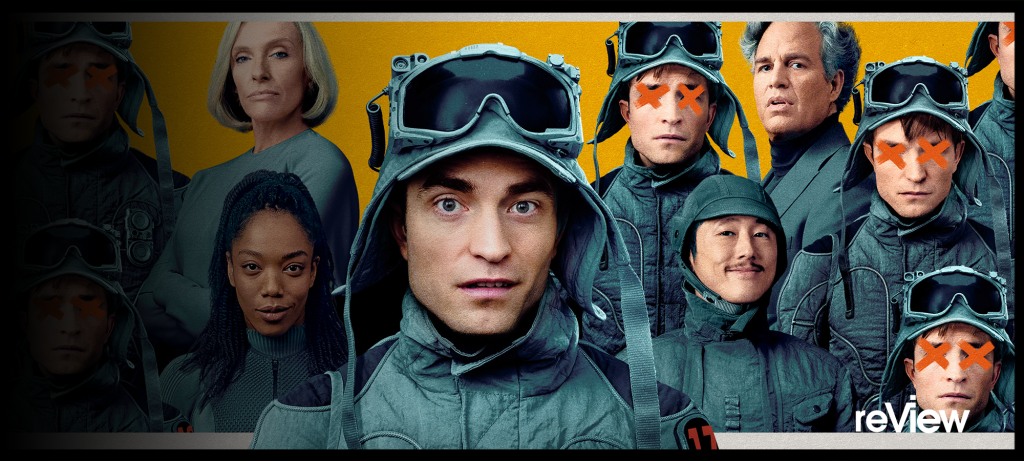RATING
Director(s): Bong Joon Ho
Country: United States, South Korea
Author: Bong Joon Ho, Edward Ashton
Actor(s): Robert Pattinson, Steven Yeun, Michael Monroe
Written by Tom Augustine.
Within the oeuvre of director Bong Joon-Ho, two films continuously vie for supremacy among cinephiles. The first is Parasite, the film that represented Director Bong’s ascendancy on an international level, an airtight work of class commentary as thrillingly energetic as it was blistering and devastating. The other is Memories of Murder, an astonishing 2003 crime drama that preceded (and possibly bettered) David Fincher’s Zodiac, working in much the same mould. Quiz most Director Bong fans and they’ll inevitably give you one or the other as their favourite — and yet both are somewhat unique in the South Korean maestro’s career for their striking tonal consistency. Outside of these two works, Director Bong’s films have something of rep for wild swings of mood, smashing the cartoonish up against the grimily real, resulting in an alchemical mixture that is by turns off-putting and fascinating, depending on the film. This is particularly true of his English-language forays Snowpiercer and Okja, which represent some of his least successful offerings to date. Both are blunt, bleak satires that utilise starry casts to muddled ends, often saddling the most cartoonish roles on the most well-known stars (Tilda Swinton’s teeth-forward Margaret Thatcher-clone in Snowpiercer, Jake Gyllenhaal as a wannabe Steve Irwin in Okja).
It’s a pleasant surprise, then, that Mickey 17 represents Director Bong’s best English-language effort yet, by a comfortable margin. Granted, the same problems exist that did in Snowpiercer and Okja, but they blend into the off-world shenanigans of this science fiction satire easier than in those (slightly) more earth-bound earlier films. Robert Pattinson stars as Mickey, who signs up for an ‘Expendable’ programme on a Blade Runner-esque off-world colony in order to escape the clutches of Earth-bound loan sharks. The Expendable programme is a process of transforming a human into a product — the subject’s mind and body are copied, cloned; and every time the subject dies a new version of them is printed (this is Mickey’s seventeenth go-round, thus the title). The community living on the spaceship bound for the frostbitten planet of Niflheim therefore utilise Mickey as chattel, and test subject, exposing him to deadly viruses, sending him into dangerous situations, and generally passing his various iterations through every ringer imaginable. Director Bong makes the parallel between Mickey’s plight and the modern wage slave existence very clear — the way late capitalism encourages even us underlings to look at each other as commodities, means to an end. The grey-clad grunts that populate the ship are barely above Mickey in status, but cling to that minor difference with a chilly ferocity, whether it’s excusing their self-preservationist antics because hey, we can just reprint Mickey after all, or ogling Mickey as a potential sex object.
What was sold as an irreverent comedy (by promotional material distributed by a company that clearly has no idea how to sell this thing) is in fact something gentler and more profoundly melancholy, as Director Bong’s films are wont to be. I was reminded of the heartbreaking first act of A Different Man while watching Mickey 17’s, in which Pattinson’s gentle doofus suffers, and is so preoccupied by his suffering that he can barely give name or shape to it. A lot of this is credit to Pattinson’s performance. Much has been made of the Steve Buscemi-esque tone of voice that Pattinson effects here, but it adds a shade of trembling vulnerability and passivity to Mickey that is really wrenching, so that even deaths that are treated as punchlines have a sharp, bitter aftertaste. This is especially heightened in the romantic relationship between Mickey and Nasha (Naomi Ackie), the strongest of the film’s many, many subplots. Ackie, a rising star after playing Whitney Houston in I Wanna Dance With Somebody and taking the lead in Zoe Kravitz’ underwhelming Blink Twice, is a genuine highlight of Mickey 17, drawn inexorably to Mickey and forging their romance in defiant flames, even as sexual relationships are discouraged by the powers-that-be (more on that in a moment). There’s a wonderful spark between Ackie and Pattinson, particularly when a second-act twist complicates their relationship, and the way Director Bong renders Nasha as the character who registers Mickey’s pain and takes on a responsibility for him is profoundly moving. I found myself almost in tears at a small moment between the two: Mickey has been subjected to a terrible, deteriorating nerve gas that is slowly killing him. While scientists watch on in hazmat suits, Nasha, who cannot bear to watch Mickey suffering alone, demands a suit for herself. She cradles Mickey as he quietly dies, the other scientists having long since moved on to other exploits, tending to him with an almost holy gentleness (the religious overtones of the framing and positioning were not lost on me). It’s the most moving moment I’ve encountered in a film this year.
Bong Joon-Ho’s follow-up to the earth-shaking Parasite has finally arrived in the form of this melancholy science fiction satire, one that overcomes jumbled, unwieldy plotting through Director Bong’s inimitable blend of peculiarity and humanism. With sterling performances by Robert Pattinson and Naomi Ackie at its centre, it is a wonderfully strange indictment of capitalism that lingers in the mind in spite of more than a little narrative spottiness.
Mickey 17 is full to the seams with small moments such as these, which ensure that an enduring affection is formed for the film even as it loses itself in myriad subplots of lesser estimation. Yes, Mark Ruffalo is playing an extremely Trump-adjacent fascist named Kenneth Marshall in the film, who is utilising the remoteness of the planet Niflheim to attempt to forge a colony made in his image and entirely subservient to him. His wife Ylfa is played by Toni Collette; the brains of the operation, she has become convinced that she is an adept saucier, and that a truly great sauce is the essence of civilisation. If this feels outlandish, know that it’s equally so on screen, and only fitfully works in the emotional span of the narrative. The book Mickey 7, that the film was adapted from, was published just a few years ago, and clearly operates with Trump on the mind — both Marshall and Ylfa are flagrant, prideful buffoons swelled with ego, who nevertheless have lucked into a feverish following from a wide base of supporters. The uniqueness of their stupidity, and the way their stupidity paradoxically ensures their power remains steadfast, would stretch believability if we weren’t witnessing the same in action in America right now.
Where Director Bong’s humanism is pointed and precise, his satire is broad and lumbering, occasionally striking gold (I must admit I found much of Ruffalo’s antics quite funny) but just as often foundering in the mud. Mickey 17 bears the scars of a rigorous edit, and perhaps a recutting process, with certain subplots withering on the vine as a result, others becoming hopelessly misty and hard to track. The Marshall element is one of these, as is the arc of a character named Kai (Anamaria Vartolomei), another crewmember and potential wrench in the carefully constructed union of Mickey and Nasha, whose entire storyline could be lifted out of the film, likely to the overall benefit of the story. Kai’s motivations are murky from the outset and remain so throughout — does she see Mickey as human, or is she another user? Is she attracted to him, or using him for her own gain? Is she a Marshall supporter, or a Marshall antagonist? The same is true of Steven Yeun’s Berto, who is both Mickey’s only friend and an obnoxious drug dealer who got Mickey into trouble with the loan sharks in the first place. How much Berto actually cares for Mickey is hard to track, despite a valiant effort from the ever-wonderful Yeun, culminating in a scene of emotional breakdown which is moving for the feeling the actor pushes out into the world, but narratively bewildering. Better is the depiction of Niflheim’s indigenous creatures, the ‘Creepers’, a gross/adorable cavalcade of grublike crosses between a centipede and a wooly mammoth. We can see where Director Bong is going with this particular narrative strand (straight down the Avatar alleyway), but the creatures are so endearingly odd that this storyline remains a winning one. It’s this oddness, this peculiarity, perhaps grown out of Director Bong’s evolution in South Korean cinema before crossing the pond, that ensures that even his messiest work is worth seeking out. No other filmmaker working at the moment creates films that conjure the specific mood that a Bong Joon-Ho film does. They aren’t very common, and, should Mickey 17 flop (which I don’t imagine is outside the realm of possibility), will likely be less and less so in the years to come. Like the lives of Mickey himself, it’s best to enjoy them while they last.
Mickey 17 is in cinemas now.

